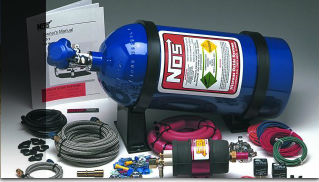 If you are car enthusiast, you have undoubtedly bumped into nitrous oxide systems. Nitrous systems are a way to boost the horsepower of an automobile for racing and specialty purposes. They are not for standard street cars, however, because they can be dangerous and will void your cars warranty. That being said, enthusiasts still install them on all sorts of cars and if you’ve wondered what they are all about, this article will help.
If you are car enthusiast, you have undoubtedly bumped into nitrous oxide systems. Nitrous systems are a way to boost the horsepower of an automobile for racing and specialty purposes. They are not for standard street cars, however, because they can be dangerous and will void your cars warranty. That being said, enthusiasts still install them on all sorts of cars and if you’ve wondered what they are all about, this article will help.
Let’s start with methods to increase an engine’s horsepower. Standard methods usually involve things like changing blocks, pistons, camshafts and other engine hardware. These methods are tried and true but require a great deal of mechanical skill and can be expensive. An alternative method is to install a nitrous oxide system.
To understand how nitrous oxide works, let’s quickly review how an engine operates. A gasoline engine’s operation depends on three factors: fuel, air and spark. The engine takes in air and fuel and ignites it with the spark. The ignited mixture results in hot, exploding gases that push pistons down their cylinders, turning the crankshaft rapidly and transferring power downstream to the vehicle wheels.
Nitrous oxide (N2O) is a powerful oxidizer. An oxidizer is a chemical that supplies additional oxygen to a chemical reaction, which is what basically is what engine combustion is. When nitrous oxide is added to the airflow into an engine, an enhanced combustion process occurs which generates considerably more horsepower.
There are two main types of nitrous systems for automotive performance use – “Wet” and “Dry” systems. Wet nitrous systems come with their own special fuel system hardware which allow you to introduce more fuel to your intake charge and increase horsepower. Wet nitrous systems are generally expensive. Dry nitrous systems, on the other hand, don’t come with special hardware and use your existing fuel system. Dry nitrous systems are generally easier to set up between the two simply because you don’t have the added fuel components to install. Most do-it-yourselfers prefer dry systems because of that feature, and the fact that they are cheaper.
Safety and legality is one concern that should be addressed whenever discussing nitrous systems. Nitrous systems really aren’t for anything but specialty vehicles. In fact, check your local laws because in some states it is illegal to have nitrous in a street vehicle, in others it’s legal with certain rules.
Source: Honda of Tiffany Springs